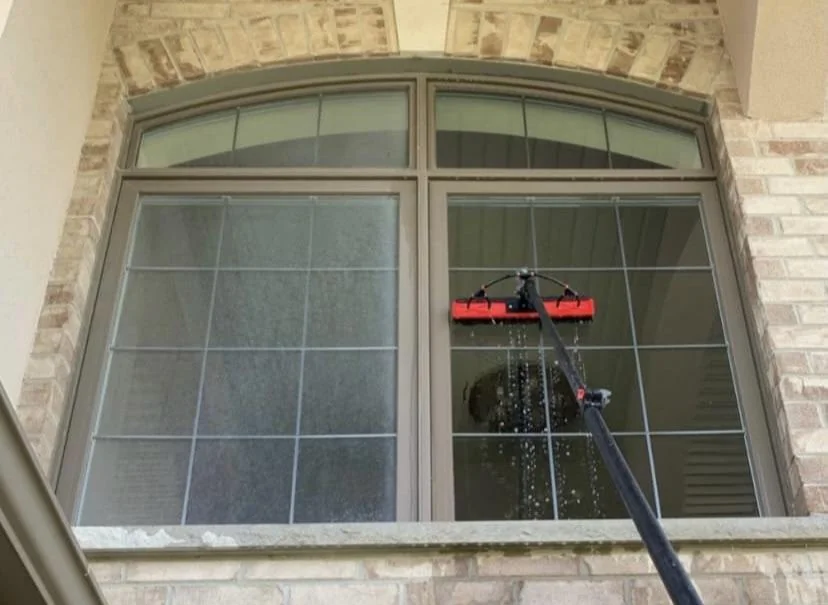The Ultimate Guide to Window Cleaning: Tips, Techniques, and Tools

Welcome to the ultimate guide to window cleaning! Clean windows are essential for homeowners wanting crystal-clear views or businesses aiming for a professional appearance. In this guide, we’ll cover everything you need to know about window cleaning, from the benefits of professional window cleaning to the best tools and techniques. Let’s get started!
Table of contents
Introduction
Clean windows can transform the look of your home or business. They let in more light, improve the view, and enhance the overall aesthetic of your property. While window cleaning might seem straightforward, it requires the proper knowledge and tools. This guide will explore everything you need to achieve spotless windows, providing tips, techniques, and recommendations for the best tools available.

Essential tools and equipment
Having the right tools is crucial for effective window cleaning. Here are some essentials:
Squeegee
A high-quality squeegee ensures a streak-free finish. Choose one with a comfortable grip and a replaceable rubber blade for the best results. A good squeegee efficiently removes cleaning solution from the glass, leaving your windows clear and spotless.
Microfibre cloths
Microfiber cloths are perfect for wiping and detailing without leaving lint or streaks. These highly absorbent cloths can effectively capture dust and dirt, making them ideal for wet and dry cleaning. Using microfiber cloths helps achieve a professional finish, ensuring your windows look pristine.
Window cleaning solution
A good window cleaning solution can cut through grime and leave windows sparkling. You can buy commercial products designed for window cleaning or make a DIY solution with vinegar and water. The right solution will make removing stubborn dirt easier and leave your windows shining.
Water-fed poles
Water-fed poles with a brush attachment allow you to clean high windows safely from the ground. These poles can extend to reach upper floors, eliminating the need for ladders and reducing the risk of falls. Water-fed poles are beneficial for large or multi-story buildings.
Ladders and safety equipment
Ladders and safety harnesses are essential for multi-story buildings. To prevent accidents, always follow safety guidelines when working at heights. Proper safety equipment ensures you can clean high windows without risking yourself.

Step-by-Step Cleaning Techniques
Follow these steps for a professional-grade clean:
Step 1: Prepare Your Equipment
Gather all your tools and prepare your cleaning solution. Having everything ready before you start will make the process smoother and more efficient. Ensure your squeegee, cloths, and cleaning solution are within easy reach.
Step 2: Remove Dust and Debris
Use a dry microfiber cloth to dust the window frame and sill, removing loose dirt and debris. This step is essential to prevent dirt from smearing when you apply the cleaning solution. Pay attention to corners and crevices where dust tends to accumulate.
Step 3: Apply Cleaning Solution
Spray or apply the cleaning solution to the window pane. Use enough to cover the surface, but avoid over-saturating. Even coverage helps break down dirt and grime, making removing it easier with the squeegee.
Step 4: Use the Squeegee
Starting at the top corner, use the squeegee to pull the solution down the window in a straight line. Wipe the squeegee blade with a cloth after each pass to avoid streaks. Continue this process until the entire window is clean, overlapping each stroke slightly.
Step 5: Detail with Microfiber Cloth
Use a microfiber cloth to wipe the edges and remove any remaining streaks or drips. This step ensures a polished finish and catches any spots the squeegee might have missed. Detailing with a microfiber cloth helps achieve a professional, streak-free look.
Step 6: Clean Window Frames and Sills
Remember to clean the window frames and sills for a complete job. Use a damp cloth to wipe down these areas, removing dust or residue. Clean frames and sills contribute to your windows’ overall cleanliness and appearance.
Safety is paramount when cleaning windows, especially for higher floors. Here are some tips:
Use Proper Equipment
Always use a stable ladder and wear a safety harness if necessary. Ensure your tools are in good condition and suitable for the job. Proper equipment reduces the risk of accidents and helps you clean more effectively.
Avoid Bad Weather
Never attempt to clean windows in wet or windy conditions, as this increases the risk of accidents. Bad weather can make surfaces slippery and reduce visibility, making it dangerous to work at heights. Choose a calm, dry day for window cleaning to ensure safety.
Follow Manufacturer Instructions
Always follow the manufacturer’s instructions for safe use when using commercial cleaning solutions or equipment. This ensures that you use products and tools correctly, minimizing the risk of damage or injury. Proper use of cleaning solutions also ensures effective cleaning results.
Take Breaks
Don’t rush the job. Take regular breaks to avoid fatigue, which can lead to accidents. Working at a steady pace helps maintain focus and prevents mistakes. Regular breaks also reduce physical strain, making the task more manageable.
Discover more safety tips in our detailed article on Safety Tips for Window Cleaning.

Different seasons present unique challenges for window cleaning. Here’s how to handle them:
Spring
Spring is the perfect time for a thorough cleaning after the winter months. Focus on removing pollen and dust buildup. Spring cleaning helps restore the clarity of your windows and prepares them for the warmer months ahead.
Summer
Clean windows early or late in the evening to avoid streaks caused by quick evaporation in the heat. Hot temperatures can cause cleaning solutions to dry too quickly, leaving streaks. Cleaning during cooler parts of the day ensures better results.
Autumn
Remove leaves and debris from window sills and frames. Check for any damage that needs repair before winter. Fall cleaning helps prevent blockages and ensures that your windows are in good condition to withstand the colder months.
Winter
Be cautious of icy conditions. Use a winter-specific cleaning solution that prevents freezing. Winter cleaning can be challenging due to cold weather, but using the right products and taking safety precautions can help maintain your windows’ clarity and condition.
Read our full guide on Seasonal Window Cleaning: What You Need to Know for more seasonal tips.

Improved Aesthetic Appeal
Professional window cleaners ensure a streak-free finish, making your windows shine and enhancing your property’s curb appeal. Clean windows create a more inviting atmosphere for guests at your home or customers at your business. The meticulous attention to detail provided by professionals can significantly improve the overall appearance of your property.
Time and Effort Saving
Cleaning windows can take time, especially for large properties or hard-to-reach areas. Professional window cleaners handle the job efficiently, using their expertise and specialized equipment to do it quickly. This allows you to focus on other important tasks, knowing that your windows are being cleaned to a high standard without the hassle and effort.
Safety
Professional cleaners have the experience and equipment to safely clean windows, even at heights, reducing the risk of accidents. They are trained in safe practices and use tools to prevent falls and other injuries. By hiring professionals, you ensure that the job is done safely, protecting yourself and others from potential harm.
Prolonged Window Lifespan
Regular cleaning by professionals helps remove corrosive substances and prevents damage, extending the life of your windows. Over time, dirt, grime, and other pollutants can cause permanent damage to windows if not properly cleaned. Professional cleaning helps maintain the integrity of your windows, preserving their functionality and appearance for years to come.
To learn more, see our post on The Benefits of Professional Window Cleaning

How often should I clean my windows
For residential properties, cleaning twice a year is generally sufficient. However, commercial properties may require more frequent cleaning due to higher traffic and pollution. A regular window cleaning schedule helps maintain a clear view and prevents dirt buildup.
Can I use dish soap to clean my windows?
While dish soap can be effective, it may leave a residue. It’s best to use a dedicated window cleaning solution formulated to leave windows streak-free and clear. Proper cleaning solutions ensure better results.
What's the best way to avoid streaks?
Using a squeegee correctly is vital. Wipe the blade after each pass and use a microfiber cloth for detailing. Ensuring that the squeegee blade is clean and dry helps prevent streaks. Additionally, avoid cleaning windows in direct sunlight, as the heat can cause the cleaning solution to dry too quickly, leading to streaks.
Following the tips and techniques in this guide, you can achieve professional-quality results with your window cleaning. Clean windows improve the appearance of your home or business and contribute to a healthier and more pleasant environment. For those who prefer to leave it to the experts, hiring a professional window cleaning service ensures a spotless finish every time.
Explore our articles linked throughout this post for more detailed guides and tips. Happy cleaning!
